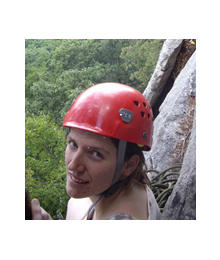An interview with Dr Megan Barnett
March 2020
Dr Megan Barnett is a Geomicrobiologist at the British Geological Survey (GBS) and a member of the Microbiology Society. In this interview, she tells us more about her research in geology and microbiology, biotechnology applications in earth sciences, and why she thinks microbiology matters.

Tell us more about your research.
I am a geomicrobiologist at the British Geological Survey (BGS). As my job title suggests, I conduct research at the interface between geology and microbiology. My research falls into two main areas. The first looks at how the microbial world could react to engineering the subsurface. The subsurface is increasingly being seen as a resource beyond a source of raw materials (including geothermal energy, carbon capture and storage), therefore understanding the physical, chemical and biological reaction to these applications is essential to ensure safe and sustainable use.
The traditional view of a sterile subsurface is being overturned. However, abundance and activity tends to be low, due to multiple extremes including restricted pore space, high pressure, low water activity; and the limited availability of nutrients, electron acceptors and organic carbon. Engineering the subsurface introduces oxygen, nutrients and micro-organisms leading to changing communities which can affect their surrounding environment. The resulting subsurface microbial activity could be of benefit. For example, methanogens could reduce the gas volume in radioactive waste repositories by combining CO2 and H2; or it could harm as sulphate-reducing prokaryotes can accelerate the corrosion of steel infrastructure. Fundamentally this aspect of my research looks into how microbiological communities may react by simulating subsurface environments in the laboratory.
What about your secondary area of research?
The second area of my research centres on biotechnology applications in earth sciences–primarily biomining, – but includes biomineralisation and biosensor development.
Micro-organisms are used to leach metals from low-grade sources, as they require less energy than most physical and chemical processes. Biomining is currently being conducted commercially for copper and gold using consortia of acidophilic autotrophs including the bacterium Acidithiobacillus and archaeon Sulfolobus. This is a highly active area of research, expanding the type of deposits and micro-organisms used.
Why does microbiology matter?
My geomicrobiology research highlights the importance of microbiology in all environments. Understanding the impact of microbiology on the subsurface is essential for its safe and sustainable use. Micro-organisms can play an important role in a green energy future by providing novel methods to process raw materials and recycle waste.


